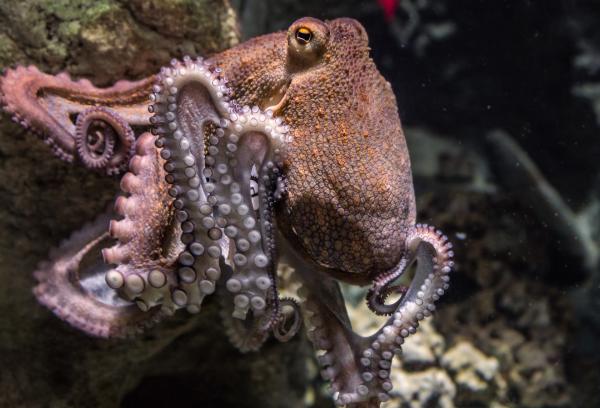This paradoxical view of octopuses and pigs came about from this article on the BBC on the proposed first “farm-raised” octopus. (There is a YouTube version of the article here.)
A quick note for those of you who will be commenting that the plural of octopus is octopi; that would be incorrect according to the Oxford English Dictionary – octopus is a Greek word, and the rules of plurals for Latin words do not apply.
A few words about the Octopus
There is little doubt that these are intelligent creatures. Its nervous system is quite different from ours, so they are often referred to as the most alien creatures we can easily interact with. (The fact that they have three hearts is overlooked by many.) As one group of authors wrote, they are playful and use observational learning. They are also predators, using venomous saliva to disable and then consume fish and crustaceans.
“through an octopus's complex nervous system, ability to survive on their own and capability of creativity, they are proven to be smarter than a 5th grader.”
Others put their intelligence at the level of a house cat. The typical means of catching octopuses in the wild is by baiting a net or pot that they can enter but not escape – a fact some might suggest arguing that they are not that smart after all.
About 350,000 tons of octopuses are captured annually. Even at a weight of about 20 pounds each, that is a lot of octopuses, and therefore the consideration that farm-raised might be more sustainable. The farm wants to produce 3,000 tons annually to serve “upscale” markets, though I doubt Whole Foods will be all in on this. The first hurdle in the project was developing a means of raising the 200 to 400,000 larvae produced by the mother octopus. This was accomplished in 2019, creating the foundation for farming (ranching?) octopuses.
The pushback against the proposed farming of octopuses has been swift. It seems to be based on concerns about humane conditions. More particularly, octopuses are territorial loners living in the dark. The farm plans on containing them in groups in small, frequently lit tanks. Conservationists argue that this housing will put additional stress on the animals. And, of course, there is concern about the means of humane slaughter. Bottom line, humane slaughter is an oxymoron, but putting that aside, the farm plans to use sub-freezing seawater to kill the creatures compared to the current methods of clubbing them to death. It is unclear whether there is a humane way to kill an octopus.
Regarding the farm's sustainability, the octopus will be fed other fish, putting additional pressure on fish populations. It may well be that to be sustainable, we need to eat a bit lower on the food chain than oceanic predators, like swordfish and tuna, and now the octopuses. There will also be additional octopus waste in the form of nitrogen, and phosphate returned to the sea. While the overall amount may be small, it is released in a very concentrated manner raising additional concerns.
Of course, much of the same consternation is raised over farm-raised pigs. They are more social animals, but their “free-range” needs are not always met by the large-scale farming we carry out. The sustainability of pigs as a food source might be estimated by the feed conversion ratio (FCR) – how much you feed them to get a pound of meat.
“FCRs are typically 6.0–10.0 for beef, 2.7–5.0 for pigs, 1.7–2.0 for chicken and 1.0–2.4 for farmed fish and shrimp. Aquatic animals have fairly low FCRs compared to land animals because they are buoyant and tend to be cold-blooded, saving energy.”
In other terms, aquaculture creates about 19g of protein for every 100g supplied – for pigs, that is 15g, and for chicken, 20. For calories, the aquaculture conversion rate is about 10%, 10 calories for every 100 fed, in the same range as chicken and pigs. [1] The data for octopuses suggest that it is in the same range as pigs, with an FCR of about 3.
What to do
Many individuals choosing a vegetarian diet come to their belief not through sustainability or taste but by an ethical concern over sentient creatures. I have discussed the paradox of my views on the octopus and the pig with my family, and we thought that a Tastiness to Intelligence Ratio Test might be helpful. You can rank all the creatures on a 1-10 scale of Tastiness and Intelligence. (For the sake of convention, humans are a ten on the scale of Intelligence. If the “reports” of cannibals are believed, humans have a tastiness between chicken and pork, say a 7.)
- If intelligence is far lower than taste, which might be the case with most vegetables and fruit, eat away.
- If intelligence is greater than taste, leave them alone. For me, that means the pig with an intelligence of 9 but a tastiness of 10 remains on the menu.
- When intelligence and tastiness are identical, and for me, that is the case with the octopus, the call is up to you. I chose to let them be. My friend believes kale has no taste or intelligence and prefers not to eat it ever.
Obviously, the individuals who consumed 300,000 tons of octopuses last year disagree. Interestingly, many are Spanish, and if you have spent any time in Spain, you know that being a pig in that country also guarantees a very short life.
[1] Beef is a complete waste of time, generating 4g of protein for every 100g fed and one calorie for every 100 calories provided. The efficiency of our diet, moving those nutrients into our bodies, deteriorates as we eat further and further up the food chain.
Sources: World's first octopus farm proposals alarm scientists BBC
If you want to know what aliens will be like, just look at an octopus TED




